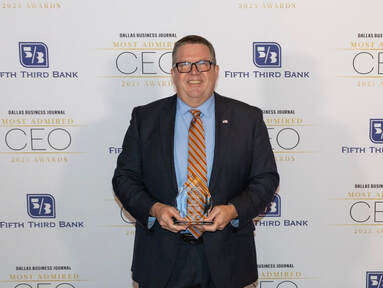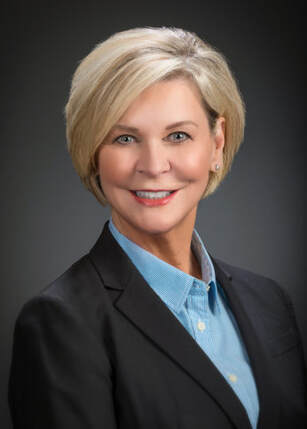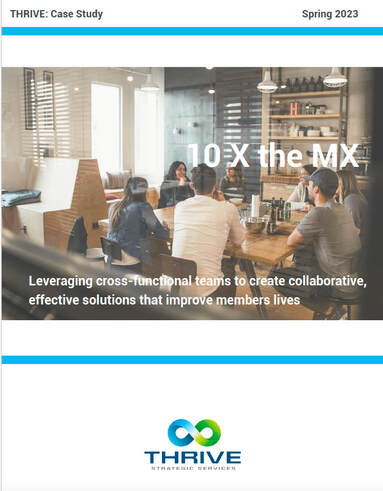 Jim Minge Jim Minge Jim Minge, CEO of Texas Trust Credit Union, has been named a 2023 Most Admired CEO by the Dallas Business Journal. This year’s honorees are North Texas business leaders recognized for the exemplary stewardship of their companies, for cultivating an inclusive and collaborative work environment, and having positively contributed to the strength and stability of the local community. Of the 29 leaders selected, Minge is the sole representative from the credit union industry to earn this year’s award. He and the 28 other honorees, representing a variety of industries – from nonprofits to finance, real estate to education, and health care to hospitality – were honored during a special event June 15. The honorees are also being featured in a special publication in the Dallas Business Journal. “My name might be on the award, but this honor is a reflection of the dedication and work of every Texas Trust employee,” said Jim Minge. “It is a privilege to work with such an amazing group of people who are committed to building brighter financial futures for every one of our members.” Minge joined Texas Trust in 2011. Under his decade of leadership the credit union has tripled in size from $680 million in assets and 58,000 members to more than $2 billion in assets and 136,000 members. In 2022, despite the challenging economy, Texas Trust achieved a 14 percent increase in assets over the previous year, added nearly 4,000 members (up 3 percent), and grew lending to $1.55 billion, a 12 percent increase. Minge’s compassion for others has been infused into Texas Trust’s culture. Not only is he active on civic and non-profit boards, he has spearheaded various initiatives to encourage employees to do the same, which has increased employee volunteerism to record levels. He also paved the way to the creation of community partnerships to help fund school projects, granted hundreds of thousands of dollars in scholarships to high school and college students, and invested in multimillion-dollar sponsorships. Texas Trust has also funded large scale initiatives for the performing arts, college athletics, and financial education, and made substantial monetary donations to organizations such as Mission Arlington, the North Texas Food Bank, American Cancer Society, Toys for Tots, and numerous other causes. The credit union has also donated more than $2 million toward local school programs. Minge also established the Texas Trust Gives Foundation in 2022, pledging $800,000 in support of the Foundation’s mission of helping schools, teachers, students, and families. “The employees and members of Texas Trust are indebted to Jim Minge for his unwavering commitment,” said Larry Skinner, Board Chairman, Texas Trust Credit Union. “He has challenged and mentored each of us to do more than we ever thought possible. Through his dedication and drive to help us succeed he has made Texas Trust a fun and desirable place to work and bank.” To view the complete list of Dallas Business Journal’s 2023 Most Admired CEOs visit here.
0 Comments
 Kathleen Craig Kathleen Craig Plinqit, the first platform that brings together automated savings, data-driven financial wellness content and virtual account management, has published its newest white paper, “How To Attract and Keep Long-Term Deposits.” The white paper addresses the top challenges financial institutions face in the current market and the problems with traditional deposit growth tactics, and it offers several alternative strategies for attracting long-term depositors. Traditional deposit growth tactics, such as offering the highest interest rate on CDs, have notable downsides, including increased cost of funds and the risk of cannibalizing existing deposit relationships. Instead of relying on higher-interest products, Plinqit’s latest white paper explores how fintechs can help financial institutions earn sticky, long-term deposits and attract and retain more valuable customers over time. The white paper also reveals the benefits of using financial wellness programs and savings tools to help customers improve their financial habits and work toward their savings goals, resulting in higher account balances overall. In addition to financial wellness programs, some institutions are rolling out digital-only, affinity brands to expand into new markets on a national scale and acquire deposits. The white paper examines this trend in detail and offers best practices for institutions that choose to establish a separate digital brand. By applying the strategies outlined in Plinqit’s white paper, financial institutions of all sizes gain an unmatched opportunity to earn more deposits while empowering customers to save and consider other financial products offered by their institution in the future. “Deposit competition is fierce and many bank executives predict it will only get worse through the remainder of the year. To compete, many institutions are relying on conventional tactics, like hiking rates on deposit products and joining the CD rate wars,” said Kathleen Craig, founder and CEO of Plinqit. “While this may bring in immediate deposits, if your institution’s goal is to generate sustained profits, it is important to consider different levers for deposit growth. A solid and diversified deposit growth strategy goes beyond just acquiring short term deposits and should also attract more valuable, engaged customers who are looking to do business with an institution for the long haul, not just until the next-best offer comes along.” Craig continued, “We created this resource to support financial institutions striving to generate deposits in a way that aligns with their long-term growth goals. The institutions that find ways to attract and engage customers while helping them improve their finances will come out on top, both today and through the next economic cycle.” To read the full white paper, visit Plinqit’s website and download your free copy today.  Murray Williams Murray Williams The Credit Card Competition Act (CCCA), recently introduced in Congress, would significantly alter a credit card payment system that currently works for all parties involved, while raising costs and threatening data security for Iowa consumers. The CCCA would make changes to how credit card payments are routed, requiring card issuers (banks and credit unions) to provide at least two networks over which a merchant can process a credit card transaction. Card issuers have the most at risk with these transactions (fraud exposure), so they should decide how the transaction is processed. By giving merchants the choice, they will naturally select the least expensive option, which isn’t always the most secure for consumers’ data. The chief sponsor of the Senate bill is Illinois Senator Dick Durbin, who passed similar legislation dealing with debit cards back in 2010. While the stated intent of the CCCA is to reduce costs for merchants, we know from “Durbin 1.0” in 2010 that it had the opposite effect. A 2022 General Accounting Office (GAO) study cited Durbin 1.0 as among the top five laws and regulations most cited for the cost of basic banking services increasing and the availability of products like free checking accounts disappearing. While Durbin 1.0 reduced costs for merchants, according to a study conducted by the Richmond Federal Reserve, only 1% of merchants passed any savings on to consumers. Interchange fees, which are only a fraction of a cent per dollar transacted, are the merchants’ contribution to help cover the significant costs of operating a real-time, electronic payment network. Those costs include fraud prevention and fraudulent purchase protection that make consumers and merchants whole when bad actors attack. When data breaches happen, credit unions and banks bear the cost while merchants have no financial responsibility. Further, merchants have opposed efforts in Congress that would require them to meet the same data security standards that credit unions, banks and insurance companies must comply with under federal law to safeguard consumers’ personal information. Thus, despite the tremendous benefits afforded merchants from electronic payments, merchants are trying to reduce what they pay to support the electronic payment network while also opposing efforts to raise data security at their point-of-sale terminals. “Iowans rely on credit cards to make life happen, from paying for groceries and school supplies to covering emergency car repairs or medical expenses,” said Murray Williams, President and CEO of the Iowa Credit Union League. “The proposed changes to the interchange process will uproot a payment ecosystem that offers robust security, fraud protection, and will reduce access to credit for Iowans that often have the most difficulty accessing it.” According to a recent poll from the Credit Union National Association, reduced interchange rates would inhibit credit unions’ ability to offer credit cards:
For more information, visit https://electronicpaymentscoalition.org/resources/epc-explainer-why-congress-should-oppose-the-credit-card-competition-act-2/.  Cathie Mahon Cathie Mahon Community Development Credit Unions (CDCUs) are already leading the way in building resilient, healthy and green communities, and the Greenhouse Gas Reduction Fund (GGRF) will accelerate this transformation by financing an ecosystem that will deliver energy efficiency and solar access for households and small businesses in low-income communities, rural communities and communities of color. Today, Cathie Mahon, Inclusiv President/CEO, delivered testimony to the Senate Climate Change Task Force on the key role CDCUs can play in advancing climate solutions and equity by deploying Greenhouse Gas Reduction Fund resources to the underserved urban, rural, reservation-based, and historically redlined communities the Fund is intended to reach. The Greenhouse Gas Reduction Fund is poised to catalyze more than $200 billion in investments in clean energy and energy efficiency projects, creating good jobs, improving health outcomes by reducing air pollution, and addressing deep racial and ethnic disparities in energy cost burdens. Low-income and under-resourced communities have historically been excluded from mainstream climate finance despite well-documented needs for energy-efficient home improvements, lower utility and fuel costs, and other clean energy solutions. Ensuring GGRF funding reaches these communities by investing in CDCUs will not only advance equity but also accelerate greenhouse gas emissions reduction. Since CDCUs serve the communities most affected by the current injustices in our energy system and by climate change, they are growing their green lending expertise to meet their communities’ needs. Over 300 CDCUs offer dedicated green loan products, and a small sample of just 30 credit unions have reported a combined investment of almost $1B in green projects over the last three years, a figure that will grow significantly once the GGRF is implemented. “Inclusiv was honored to join our allies in the Community Builders of Color Coalition to discuss the transformative potential of the Greenhouse Gas Reduction Fund and the ways community development credit unions can amplify the Fund’s impact,” said Cathie Mahon, President/CEO of Inclusiv. “Community Development Credit Unions see both a responsibility and opportunity to make their communities greener and more resilient. They often serve the communities located on the frontlines of climate change that have the poorest air quality, highest energy burden and the most vulnerability to climate events like hurricanes, droughts, and wildfires. The Greenhouse Gas Reduction Fund is a critical opportunity to create more equitable environmental, energy and financial outcomes across the country.” As just one example, Tucson Old Pueblo Credit Union has been serving Arizona since 1935. They provided $25 million in solar loans in just the past year. They are one of the largest solar lenders in Tucson and a Community Development Financial Institution, demonstrating credit unions can build a scalable business by financing clean energy projects for low- and moderate-income households. Read Inclusiv’s testimony here and click here to learn more about the critical role credit unions can play in implementing the Greenhouse Gas Reduction Fund.  Cathy Pace Cathy Pace Wake Forest University is thrilled to announce a historic, long-term agreement with Allegacy Federal Credit Union, a leading financial institution and a longtime, trusted partner with mutual deep roots in Winston-Salem. The new multi-year commitment is the largest corporate partnership in Wake Forest University history, deepening Allegacy’s existing partnership with Wake Forest University by establishing the home of Wake Forest football as Allegacy Federal Credit Union Stadium. Allegacy will also become An Official Banking Partner of Wake Forest Athletics, the Exclusive Credit Union of Wake Forest Athletics, the Official Wealth Management Advisors of Wake Forest Athletics and the Exclusive Banking Partner of Wake Forest Football. Additionally, Allegacy will become Wake Forest’s Preferred Student-Athlete Financial Education Provider, providing the availability of Allegacy financial experts to assist Wake Forest student-athletes with general financial matters and education. Allegacy Stadium anchors the largest sports and entertainment quadrant west of Greensboro and north of Charlotte. As such, it broadens the credit union’s visibility among the cumulative 250,000 fans and 45,000 students who attend Demon Deacons football games and the nearly 20 million total television viewers who watch the Deacs’ football games each year. Additionally, Allegacy Stadium will host future external events similar to the Sir Paul McCartney concert in May 2022, attended by more than 34,000 fans with tickets purchased by residents in all 50 states, plus D.C., Canada and Mexico. “Allegacy CEO Cathy Pace and I share a strong commitment to the wellbeing and future of the Winston-Salem community and our region,” said Wake Forest President Susan R. Wente. “I want to thank her and Allegacy’s board of directors and executive leadership team for their deep collaboration and engagement throughout this process as we announce this historic agreement today. Allegacy’s strategic investment in partnership with Wake Forest will support the continued success of both organizations, and provide new, exciting opportunities for Wake Forest students and employees.” For more than 20 years, Allegacy has partnered with the Wake Forest family to advance the community’s wellbeing. The University and Atrium Health Wake Forest Baptist Medical Center have been longtime members of Allegacy’s Select Employee Group (SEG), offering employees the distinctive benefits of the credit union in strengthening financial wellbeing. The Allegacy Center for Leadership and Character at Wake Forest’s School of Business accelerates the School’s mission to develop leaders of character to serve the greater good through a proven track record of thought leadership, practical relevance, and partnership across Wake Forest and the broader community. Primary focus areas include creating and publishing new knowledge in top academic journals across the world, and integrating ethical leadership and character strengths into courses, academic programs, co-curricular activities, and faculty and staff development programs. “Allegacy and Wake Forest continue to be aligned in mission, ideals and principles,” says Allegacy’s President and CEO Cathy Pace. “Our approach to wellbeing is holistic in offering financial products and services that help our members be their best selves. Wake Forest’s motto, Pro Humanitate, similarly is a calling to better the lives of others. With this ongoing partnership, we are each building on a proud legacy and a commitment to innovation in education and wellness.” Pace serves as a member of Wake Forest’s School of Business Board of Visitors. Allegacy and Wake Forest share a common origin in Winston-Salem. The land of Wake Forest University’s Reynolda Campus was originally part of the estate of R.J. and Katharine Reynolds; Allegacy was founded in 1967 as the Reynolds Carolina Credit Union to serve RJR employees. “Allegacy’s unparalleled commitment to serving their members and improving our community aligns perfectly with our Wake Forest Athletics goal of providing the Best Fan Experience in North Carolina,” says director of athletics John Currie. “From our initial conversation about the concept of Allegacy Stadium to the culmination of this announcement, it has been inspirational to see the synergy of Cathy Pace and her leadership team with our Wake Forest staff. This is a unique opportunity to deepen a partnership which has impacted hundreds of thousands of people across our Winston-Salem community and beyond over the past two decades. And, the extension of Allegacy’s relationship with our School of Business, led by Dean Annette Ranft, along with the Office of Professional & Career Development provides a broader impact on both Wake Forest students and the entire community.” “On behalf of our Demon Deacons football program, we are all extremely grateful for Allegacy’s support of Wake Forest football and our University overall,” says head coach Dave Clawson. “This agreement will allow for more financial education for our players to help them create promising futures. I appreciate the thoughtful approach our administration and Allegacy’s leadership put forth into this partnership to help enhance the entire community. We look forward to kicking off the 2023 season inside Allegacy Federal Credit Union Stadium on Aug. 31!” Independent Sports and Entertainment (ISE) assisted in the development of the naming rights and new partnership agreement between Allegacy and Wake Forest. “We were impressed with ISE’s professionalism, guidance, knowledge and commitment,” says Allegacy’s Pace. “Their depth of experience was invaluable in helping us through this process.”  Elisabeth Hadler Elisabeth Hadler The $274.4 million Great Basin Federal Credit Union had a banner year in 2022 and is looking to continue its growth in 2023. The credit union expanded its field of membership at the end of last year from one county to 12 counties without adding any new branches. Instead, Great Basin FCU Chief Experience Officer Elisabeth Hadler turned to uncommn to redesign the credit union’s website. To continue serving its new membership with the same local feel, Hadler explained that the new website had to have a top- notch user experience and speak to all the existing and new potential members in the 12 counties it now serves in Nevada and Idaho. The credit union’s top objectives are to grow its membership and deposits, leveraging its virtual financial coaching opportunities and knowledge base. Great Basin’s new website will play a key role in that as the hallmark of the credit union’s online presence. Hadler shared that Great Basin’s key differentiator has always been its simplicity and demonstration of empathy for its members. The credit union had already defined its brand, and uncommn helped them to further hone personas and the feelings of the members they represent to enhance the credit union’s focus on who it serves and why, she said, before even discussing the credit union’s new website. “The team at uncommn was willing and able to peel back the onion to understand us, and also for us to understand us,” Hadler said. “The end result was a position statement that helped us understand who we’re serving and why.” For example, fewer clicks for members to get to critical information and fewer website pages in general demonstrate the simplicity members have come to expect from Great Basin. “uncommn is not about just building a site they think looks cool,” Hadler emphasized. As a result, very few changes were made after the first peek at the website, according to Hadler. “Alex [Vanhaasteren, senior web developer] is super responsive, and Courtney [Bravo, senior client success manager] was very helpful with copywriting and branding decisions.” Great Basin’s team is very excited about the more modern look and experience of the website, Hadler said. They especially love how easy the pages are to update as rates are in flux. “Elisabeth and the Great Basin team came to us with ideas and were highly receptive to ours as well,” uncommn’s Bravo said. “Ensuring the website would connect with its existing members and the many new potential members can be challenging. However, we worked through our process with them to innovate their online presence, so they can focus on maintaining and building trust with their existing and new potential members. We’re proud of the end results, and we’re happy that Great Basin is, too!”  THRIVE Strategic Services has released its latest case study, “10X the MX: Leveraging data and cross-functional teams to improve members’ lives.” 10X the MX is a successful problem-solving methodology based on design thinking framework that builds; 1) data consumption capability that increased member experience & satisfaction, 2) organizational efficiency/process improvement and 3) empowered credit union talent to increase satisfaction that established a capability of critical thinking and execution. This case study highlights the work THRIVE accomplished with Corning Credit Union, $2.3 billion assets serving over 1,700 employer groups and business and over 150,000 members. Anne Crowley, Corning Credit Union EVP and COO, who worked in tandem with THRIVE said she was pleased with the way THRIVE really got to know them as a credit union and how flexible they were in customizing this experience to the uniqueness of their culture. “The Corning team saw the value in an external partner with vast experience designing educational experiences that delivered a critical thinking and iterative execution framework in the credit union space,” said Crowley "When we started with THRIVE, we came into it with talented employees, but lacking a formal framework to solve problems and create enhancements with data utilization as a key factor," she added. "THRIVE provided a proven framework that provided clarity and accountability and focus on the member problem our team wanted to tackle while building a formal critical thinking capability."  Slaven Bilac Slaven Bilac Agent IQ, a provider of digital customer engagement solutions specializing in making financial services more personal again, announced today the Lynq™ platform is available on Temenos Exchange, the partner ecosystem of integrated fintech solutions. Driven by AI-augmented and personal communication, the Lynq platform enhances the digital banking experience by enabling customers to engage with personal bankers via their preferred digital channel. Agent IQ’s Lynq platform adopts a customer-first approach to engagement, including 24/7 AI self-service, video communication features and screen sharing capabilities. The engagement platform also automatically presents answers to frequently asked questions, while empowering customers to connect and engage persistently with a trusted banker both during office hours or request follow-up outside of office hours. Temenos Exchange brings innovation to market faster, and at scale. The ecosystem offers pre-integrated and approved fintech solutions that can be easily deployed on top of Temenos open platform for composable banking, enabling banks to accelerate the creation of new financial services, while reducing the costs of development. “Temenos Exchange acts as an accelerator for fintechs and software developers, helping them develop, validate and monetize new banking solutions,” said Martin Bailey, Director of Innovation and Ecosystems, Temenos. “The integration with Temenos and joining Temenos Exchange means Agent IQ can write once and be readily available to the thousands of banks globally that run on our platform.” “Joining Temenos Exchange not only further positions Agent IQ as a provider of leading personal digital engagement technology, but it also extends our commitment to the banking community while enabling Temenos customers to easily reap the benefits of Lynq,” said Slaven Bilac, CEO & co-founder, Agent IQ. “Through this partnership, Temenos customers are enabled to easily reap the benefits of Lynq by digitally connecting customers with bankers in real time through a secure chat platform. We look forward to leveraging the power of the Temenos platform to help us achieve our business goals.” RiverLand Federal Credit Union Launches Mahalo Banking Platform to Accelerate Digital Innovation6/20/2023  Denny Howell Denny Howell Mahalo Banking, a CUSO that provides online and mobile banking solutions for credit unions, today announced a new platform launch with New Orleans-based RiverLand Federal Credit Union (‘RiverLand’ – more than $300M in assets). The credit union is leveraging the Mahalo platform to accelerate its digital transformation while improving member self-service functionality. The Mahalo platform enables the credit union to enhance its digital experience by providing greater security, added self-service options and more modernized functionality. Some of the new features being implemented by RiverLand include card controls, P2P payments and credit score views. By adding these features, the credit union is able to offer its members greater independence within their digital banking experience, which will ultimately lead to more meaningful interactions between the staff and members when direct assistance is necessary. “Our digital banking experience was outdated; it needed to be fresh and updated more frequently to better reflect our members’ financial needs,” said George Lunsford, RiverLand President and CEO. “It was important to offer our members greater financial autonomy and include features where they could better engage with the platform. When selecting Mahalo, we knew they would prioritize delivering platform updates to support the initiatives that are important to our membership base. Mahalo provides new features promptly and smoothly, allowing us to streamline our digital transformation process and meet member expectations.” In addition, leveraging Mahalo’s technology allows RiverLand to deliver feature parity across the credit union’s online and mobile banking experiences. This enables the credit union to create a more unified and cohesive digital banking experience for its members. Built by credit union industry natives, Mahalo Banking offers a digital banking platform that delivers intuitive, inclusive features that meet the needs of all members. The platform was recently enhanced to incorporate Thoughtful Banking™, the industry’s first and only online banking solution to fully integrate comprehensive neurodiverse functionality. Mahalo’s platform also provides a secure architecture, deep integrations into credit union cores and streamlined third-party integrations. “Picking up the pace of innovation is a challenge for many credit unions today, and selecting the right digital banking partner is pivotal to this process,” said Denny Howell, co-founder and COO of Mahalo. “Regular platform updates are vital to our credit union customers’ ongoing digital transformation, which is why our team routinely delivers the features they need to remain innovative and member-first. Working with RiverLand offers our team yet another opportunity to strengthen a credit union’s competitive edge in a constantly evolving digital landscape.”  Milind Borkar Milind Borkar Glia, the customer interaction leader unifying Digital Customer Service (DCS), phone and automated self-service on a single platform, and Illuma Labs today announced a strategic partnership to streamline voice authentication for customer service interactions. By integrating Illuma Shield™ with the Glia Interaction Platform, financial institutions can offer quick, seamless and secure real-time voice authentication that enhances the customer experience, improves operational efficiency, and helps prevent fraud. Milind Borkar, CEO and founder of Illuma noted, “Glia’s ChannelLess™ solution enables a frictionless experience that enhances the customer experience and drives new efficiencies. Illuma Shield™ fits seamlessly with the Glia Interaction Platform, adding more efficiency by making voice authentication effortless. Our joint customers are experiencing the real value that the Glia and Illuma partnership delivers.” According to Eric Valla, CIO at WyHy Federal Credit Union, “The more complex authentication is for telephone banking, the more friction members face during an interaction. Illuma’s real-time voice authentication makes it easy to begin an engagement and the Glia Interaction Platform makes it seamless from start to finish. This combination has greatly improved our overall member experience.” Jennifer Zorn, EVP and CIO for Evans Bank commented, “We wanted to remove friction from the authentication process and also enhance security for our customers. Illuma delivered a frictionless approach with voice authentication that matches the seamless interactions that Glia provides. We were impressed with the joint solution, as well as the white-glove implementation experience provided by both companies.” The Glia Interaction Platform brings Digital Customer Service (DCS), traditional phone and AI-driven self-service options together to enable a seamless experience that can accelerate interactions and drive new opportunities. Steve Kaish, SVP of Alliances for Glia stated, “Illuma and Glia share a philosophy on making each customer interaction as effortless as possible. Authentication, particularly for phone banking, has traditionally been cumbersome and a major source of friction. By verifying enrolled customers in the first few seconds of natural conversation with the Illuma Shield™ software, Glia quickly enables an authenticated interaction, reducing fraud and letting customers focus on their immediate need, be it an account balance, mortgage inquiry or loan origination.” |
Author: Mike LawsonMarried to a most gorgeous and wonderful wife, raising 5 kiddos (including twins!), enjoy helping others tell their stories, and love surfing SoCal waves. Keep it simple. Archives
May 2024
Categories |


 RSS Feed
RSS Feed
